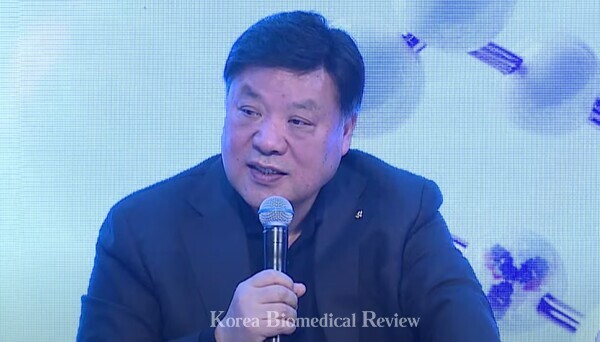Celltrion Group Chairman Seo Jung-jin detailed his company’s comprehensive growth strategy during an investor conference in Hong Kong on Wednesday, outlining the company's evolution from a biosimilar pioneer to an integrated pharmaceutical innovator.

Seo provided detailed plans for its most recent major strategic development, which was to enter into the contract research development manufacturing organization (CRDMO) business.
“The company will establish a wholly-owned subsidiary in December 2024, backed by an initial investment of 1.5 trillion won ($1 billion) from internal funds,” he said. “The planned facility, with construction starting in 2025, will feature a 200,000-liter production capacity in Korea, with potential for overseas expansion.”
The funds will come from a certain portion of the treasury shares that the company has repurchased over the years, he added.
Seo explained the scope of their CRDMO services.
"We are very familiar with and have expertise in the CMO business because we started it first 20 years ago,” Seo said. “The company plans to offer a wide range of services, including monoclonal antibodies, bispecific antibodies, and antibody drug conjugates (ADCs).”
Also, Celltrion will provide subcutaneous formulation technology utilizing hyaluronidase, which will become available after 2027 when Halozyme's patent expires, the group chairman added.
The company has already internalized this technology for its own products and plans to offer it as a service to customers upon request.
The CRDMO initiative will be supported by new research centers across Korea, the U.S., Europe, and India, with plans to hire 500 Ph.D.-level researchers, Seo added.
Seo stressed that Celltrion aims to differentiate its CRDMO services by offering comprehensive solutions including monoclonal antibodies, bispecific antibodies, conjugation technologies, and various delivery systems.
“The company expects to commence CRDMO operations by 2028, targeting revenue of at least 100 billion won per 10,000 liters of capacity,” he said.
Seo also outlined plans for cell and gene therapy services.
"We will be willing to invest in the infrastructure within the hospital under a contract if the hospitals want cell and gene therapy,” he said. “This personalized medicine approach will utilize state-of-the-art automation to minimize labor costs while maintaining high value-added services.”
Seo promised that Celltrion's CRDMO offering would be more comprehensive than that of its competitors.
"We believe that we can offer CRDMO solutions that are deep in science based on our expertise,” he said. “The company's technology portfolio includes mRNA vaccine platforms, microbiome technology, peptide development capabilities, chemical platforms, and conjugation technologies.”
Revenue from the CRDMO business is expected to begin in 2028, contributing significantly to the company's growth trajectory, he added.
Company’s sales trajectory
Seo also mentioned the company's ambitious sales trajectory during his presentation.
“The company maintains its 2024 sales target of 3.5 trillion won and projects reaching 5 trillion won in 2025,” Seo said. “This growth trajectory is expected to continue, as we aim to achieve 7-8 trillion won by 2026 and 10 trillion won by 2027.”
Chairman Seo expressed confidence in meeting these targets, citing strong performance across the company's product portfolio, with Remsima alone expected to generate over 1 trillion won in 2024.
A significant focus of the presentation was Zymfentra, marketed as Remsima SC in Europe, Celltrion's first novel drug.
Despite initial delays in securing U.S. insurance coverage, which pushed the timeline back by approximately four months, the company expects Zymfentra to generate sales of 700 billion won in 2024.
“The drug, which revolutionizes inflammatory bowel disease (IBD) treatment by offering a subcutaneous alternative to intravenous infusion, is patent-protected until 2040,” Seo said.
Seo provided detailed context about the IBD market, noting that approximately 0.16 percent of the global population suffers from IBD, with 55 percent of cases being Crohn's disease.
The company's strategic positioning in this space is strengthened by Zymfentra's role as a TNF-alpha inhibitor, which Seo described as the most potent treatment option for these conditions.
Innovative pipeline development and future drug candidates
Seo explained that company's R&D pipeline showcases its commitment to innovation through the development of cocktail therapies combining Zymfentra with IL-23 inhibitors, advancement in oral formulations of biological drugs including successful phase 1 completion for an oral version of ustekinumab, and progress in ADC candidates, with three entering phase 1 trials in 2024.
“Additionally, Celltrion is advancing four bispecific antibody programs, with one candidate moving to phase 1 in 2024, while also developing proprietary mRNA vaccine platform technology and microbiome therapeutics targeting conditions such as IBS, Parkinson's disease, and atopic dermatitis,” he said.
In concluding the presentation, Chairman Seo emphasized that the company's future extends far beyond its biosimilar origins.
“Our transformation from a biosimilar pioneer to an innovative drug developer, coupled with our expansion into technical services, positions us uniquely in the global biopharmaceutical landscape," Seo said. "We remain committed to delivering substantial growth while maintaining our focus on performance and profitability, ensuring we meet the expectations of our investors."
Related articles
- Celltrion's Prolia and Xgeva biosimilars win approval in Korea
- Celltrion acquires iQone Healthcare Switzerland for ₩30 bil. to boost European expansion
- Celltrion releases Stelara biosimilar in Germany, Netherlands
- Celltrion’s phase 3 trial confirms Yuflyma’s interchangeability with Humira
- Celltrion invests ₩100 bil. in 4th share buyback to boost shareholder value
- Celltrion Pharm secures permit for 3-combo hypertension and dyslipidemia drug
- Celltrion files European IND for phase 3 trial of Darzalex biosimilar
- Celltrion partners with BioMe to advance microbiome-based drug development
- Celltrion announces largest-ever dividend with cash and stock payouts
- Celltrion to establish research center in India as part of global CDMO expansion
- Celltrion's Zymfentra wins nod for rheumatoid arthritis phase 3 trial in Europe
- Celltrion’s Actemra biosimilar wins approval in Korea

